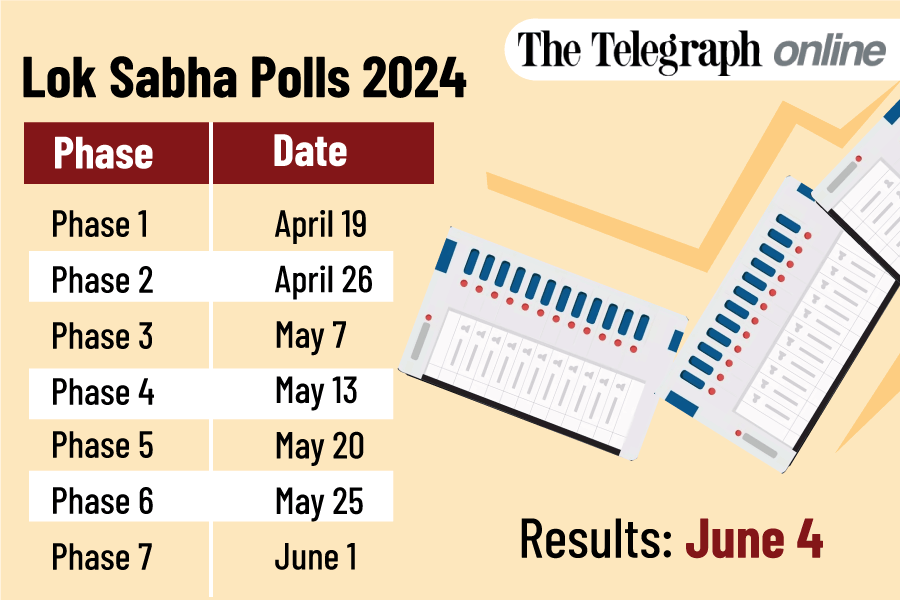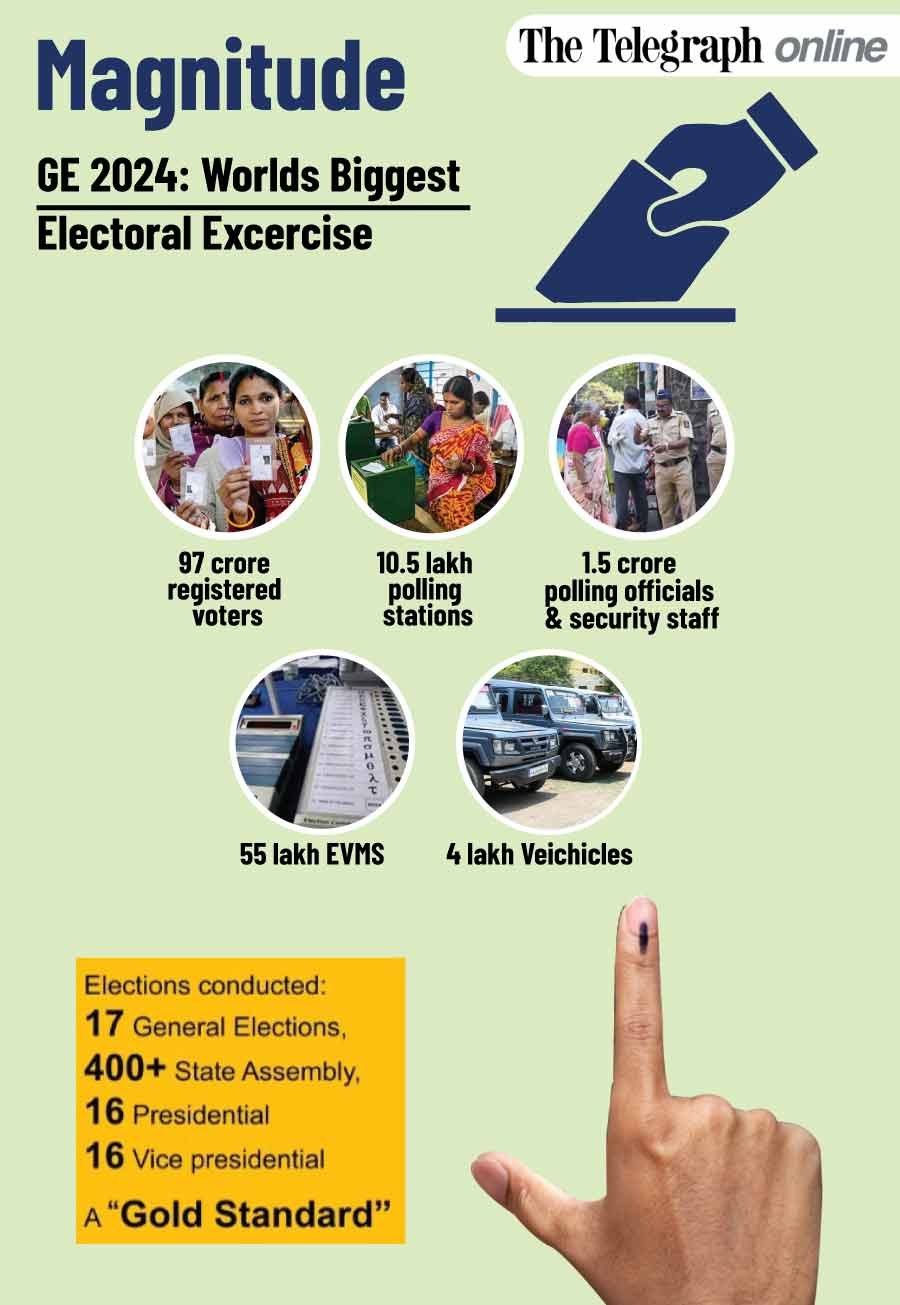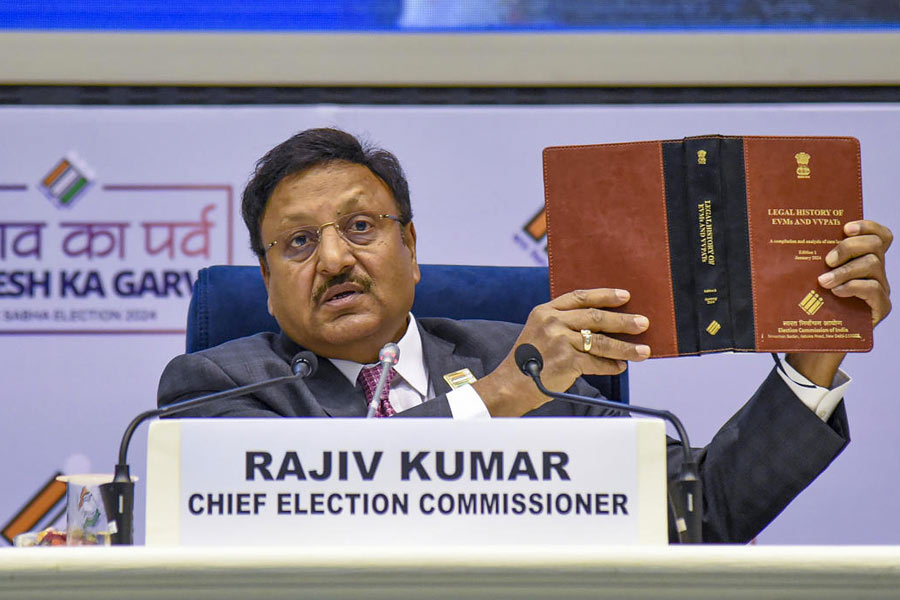Indians will give themselves a new government on June 4 after a seven-phase Lok Sabha election that kicks off on April 19. Assembly polls in Andhra Pradesh, Arunachal, Odisha and Sikkim, along with 26 Assembly by-elections elsewhere, will also be held during the long summer at the hustings.
Chief election commissioner (CEC) Rajiv Kumar said the Assembly polls in Jammu and Kashmir — pending since 2019 — cannot be held as part of this round of elections despite the demands as they would require a much larger security cover for the candidates.
However, voting will be held for the five Lok Sabha seats in Jammu and Kashmir — in five phases.
The first phase of voting for the Lok Sabha elections will be held on April 19 and the seventh on June 1. Counting for all the phases, as well as for the Assembly polls and by-elections, will take place on June 4. The Lok Sabha’s tenure lasts till June 16.

Voting for the Assembly seats, including the by-elections, will take place on the same day as their corresponding Lok Sabha seats. Arunachal and Sikkim will vote in the first phase, Andhra in the fourth (May 13), and Odisha in four phases from May 13 to June 1.
Asked about Jammu and Kashmir — where the Supreme Court has asked the Election Commission to complete Assembly elections by September — CEC Kumar said the poll panel had gone by the advice of the territorial administration rather than the political representatives.
He argued that technically, the Jammu and Kashmir Assembly polls have been pending not since 2019 but since December 2023, when the delimitation of seats in the Union Territory received parliamentary endorsement.
“They (the Delimitation Commission in 2022) changed the number of seats (from the previous Assembly of the undivided state).… (The) Reorganisation Act (2019) and the delimitation were not in sync,” Kumar said.
“Therefore, there was no occasion for the commission to conduct elections till that (bringing them in sync) happened.... This happened in December 2023 by amendment (to) the J&K Reorganisation Act.”
Kumar added: “All parties told us to conduct the (Jammu and Kashmir) Assembly polls with the parliamentary polls. The entire administration told us that we should not do so….
“In every Assembly (constituency in Jammu and Kashmir) there are 10 to 12 candidates, that’s an additional 1,000 candidates (over and above the Lok Sabha candidates). In J&K, all candidates get at least two sections of security each. We would need around 450 to 500 more companies, which cannot be provided right now.”
Kumar said the Jammu and Kashmir Assembly polls would be conducted as soon
as forces were available after the parliamentary elections.
Some 96.88 crore voters are on the rolls for this general election, an increase of 7.28 crore from the 2019 polls. More than 1.18 lakh are overseas electors — who need to come home to vote — 19.08 lakh are service voters, and 48,044 are third-gender voters.
More than 2.18 lakh voters are aged above 100 years, and 1.84 crore are 18 to 19 years old. Women voters outnumber men in 12 states.

Kumar promised stricter action against violations of the Model Code of Conduct (MCC).
“We have asked political parties to give copies of our guidelines to each star campaigner. We will also look at the past. We might look at a calibrated approach
to deal with MCC violations,” he said.
A reporter asked Kumar whether action based on precedent might not hurt
the Opposition disproportionately, given that Prime Minister Narendra Modi and Union home minister Amit Shah had not been found guilty of any violations in the last five years despite several complaints.
Kumar replied: “Howsoever high the star campaigner he or she may be, we will not sit back. We will take action.”
He said that at least half the polling stations would have CCTV cameras.
The period from the declaration of the polls to the counting covers 81 days, six more than that in 2019.












